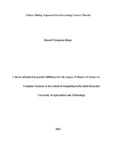| dc.description.abstract | Healthcare facilities have at their disposal vast amounts of cancer patients’ data. The analysis of available
data can lead to more efficient decision-making. The challenge is how to extract relevant knowledge from
this data and act upon it in a timely manner. To turn into knowledge, efficient computing and data mining
tools must be used. This data can aid in developing expert systems for decision support that can assist
physicians in diagnosing and predicting some debilitating life threatening diseases such as cancer. Expert
systems for decision support can reduce the cost, the waiting time, liberate medical practitioners for more
research and reduce errors and mistakes that can be made by humans due to fatigue and tiredness. The
process of utilizing health data effectively however, involves many challenges such as the problem of
missing feature values, data dimensionality due to a large number of attributes, and the course of actions
to determine features that can lead to more accurate diagnosis. Effective data mining tools can assist in
early detection of diseases such as cancer. This research proposes a new approach called Information
Gain Artificial Neuro-network Fussy Inference System (IG-ANFIS). This approach optimally minimizing
the number of features using the information gain (IG) algorithm, then applies the new reduced features
dataset to the Adaptive Neuro Fuzzy Inference system (ANFIS). The research also proposes a new
approach for constructing missing feature values based on iterative k-nearest neighbours and the distance
functions | en_US |

